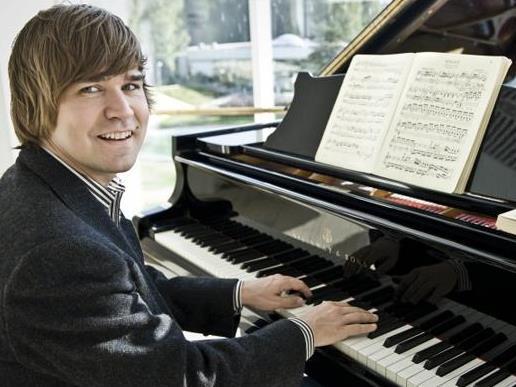Paavali Jumppanen.
After a stellar path into the heavens with their two latest concerts – Timeline a two-and-a-half-hour journey through the entire history of music up to the present, and Mahler 4 & Sibelius 6 a master class in the symphonic mode – the Australian Chamber Orchestra falls back into the stratosphere for this newest outing, Piano Quintets. Not that the stratosphere is not a nice place to be, mind you. There’s plenty of space, for instance. And ventilation. But no stars.
The highlight of it all was Shostakovich’s ‘Piano Quintet in G Minor, Op.57’, which the quintet played with a deliberate and restrained passion (much like Shostakovich was eager to have the players at the original premiere do). Asked specifically by the Glazunov Quartet to write a piece for them, he included a piano part so that he might be able to tour with them, although he never took his music abroad. The piece itself has its heart in the slow second movement – the ‘Fugue: Adagio’ – which happens to be the longest movement as well. Here the quintet was never rushed, nor were they self-indulgent, and the results were remarkable. For the remaining movements, the quintet dispatched with the appropriate and varying levels of irony that Shostakovich inevitably calls for, to, in the end, give a colourful and lively interpretation, though not overwriting memories of previous performances by other ensembles.
The principal violist of the ACO, Christopher Moore, introduced the second half by detailing the various instruments acquired by the institution’s instrument fund. Referring, somewhat accidentally perhaps, to the anonymous benefactor of their latest acquisition as a ‘he’, Moore went on to demonstrate the aural power of the new marvel, a 1610 Maggini. The piece chosen for this auspicious introduction was the waltz from Brahms’ second violin sonata, with Finnish pianist Paavali Jumppanen providing the piano. Jumppanen, on stage the entire time, was a generous presence, and performed with a quiet charisma.
The concert opener, one of those pieces of programming that always make an ACO concert an enticing proposition, was a duo consisting of Jumppanen and violinist Satu Vanska, with Lutoslawski’s ‘Subito for violin and piano’. Subito, for those readers who do not have a comprehensive understanding of Italian, means ‘suddenly’, often used by composers in their scores to indicate an instant change in either volume or tempo. Written for and commissioned by the 1992 International Violin Competition of Indianapolis, it is a piece obviously designed to show off the violin, and Vanska showed off admirably. As a palate cleanser for the hustle and bustle of life pre-concert, too, it served a good purpose.
We finished the evening at the City Recital Hall with an outing of Dvorak’s perennial favourite, his ‘Piano Quintet in A major, Op.81’. When this critic thinks of the ACO, he thinks of rapt attention and brilliant musicality that leaves a mark on the soul, but that was not the case here. Not that the interpretation was bad by any means, but it came across as music to be washed over oneself, instead of savoured at every drop. The ACO wasn’t quite at their best, one thinks, but that was, for the most part, more than enough to satisfy anyway.
Rating: 4 out of 5 stars
Australian Chamber Orchestra: Piano Quintets
Witold Lutoslawski – Subito for violin and piano
Dmitri Shostakovich – Piano Quintet in G minor, Op.57
Antonin Dvorak – Piano Quintet in A major, Op.81
Piano: Paavali Jumppanen
Violin: Satu Vanska
Violin: Rebecca Chan
Viola: Christopher Moore
Cello: Timo-Veikko Valve
City Recital Hall, Angel Place
www.aco.com.au
15 July





